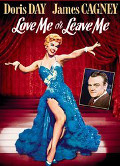
Directed by
Charles Vidor
122 minutes
Rated PG
Reviewed by
Bernard Hemingway

Love Me Or Leave Me
Although its production values share much with the standard style of Hollywood biopic this account of the life of now-largely-forgotten 20s and 30s singer Ruth Etting and her involvement with a small-time clubfooted Jewish gangster from Chicago named Marty "The Gimp" Snyder is surprisingly meaty. This is largely due to the winning performances from Doris Day and James Cagney in the leads.
Etting wanted Jane Powell, who both sounded and looked like her, to be given the role but MGM took Cagney's suggestion of Day and it paid off, Day "whitewashing" the less palatable aspects of Etting's character. Cagney chews up the scenery in a vitriolic performance reminiscent of his classic gangster roles, whilst the unflappable Day is remarkably alluring throughout. She gives fine renditions of many of the standards Etting made famous such as 'You Made Me Love You', 'Mean to Me', 'Shaking the Blues Away', and 'Ten Cents a Dance' as well as the title song.
Although teh film tiptoes around the pre-marital sexual relationship between Etting and Snyder and the former’s relationship with the bottle, Day presenting a much more sympathetic character than the story implies, the script, taken from a story by Daniel Fuchs, who co-wrote it with Isobel Lennart, is unusually candid for its time in portraying the almost sado-masochistic co-dependent relationship in which the two were caught.
Less successful is the film’s portrayal of Etting’s relationship with pianist Johnny Alderman played by Cameron Mitchell (an actor whose film career never took off but who can be seen in bit parts in countless movies including quite a few Spaghetti Westerns) who comes off as a rather drab individual. The film was huge hit in its day and earned six Oscar nominations including a third Best Actor nomination for Cagney.
Want something different?





